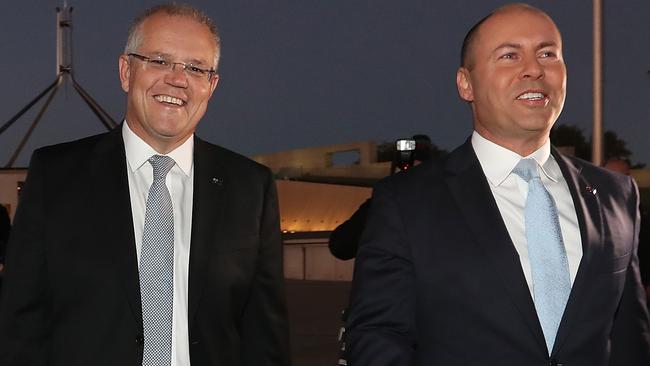Coalition eyes June parliament return for tax cuts if re-elected
If re-elected, a Morrison government would make parliament sit in June to ram through its tax plan.

A returning Morrison government would drag parliament back to sit in June if it wins the federal election to ram through its tax cut plan for low- and middle-income workers before the end of the financial year.
Although the government scheduled very few sitting weeks this year and is staring down electoral defeat, according to Newspoll, Josh Frydenberg has committed to ensuring the first stage of his flagship $160 billion tax cut plan will take place.
The Australian Taxation Office has said it would be unable to process the larger tax refund plan unless the government passes the legislation announced in the budget.
“Should the government be re-elected, the timing of the election will not affect low- and middle-income earners receiving a benefit of up to $1080 — or up to $2160 for a dual income family,” the Treasurer said.
“Taxpayers will be able to access the offset after they lodge their end of year tax returns from 1 July 2019, which is in just 13 weeks’ time,” he said. “This is consistent with past practice.”
Mr Frydenberg last week expanded the Coalition’s $144bn, 10-year tax cut plan, announcing $158bn worth of income tax relief measures, which he hailed as the “largest personal income tax cuts since the Howard government”.
The proposal will double the maximum low- and middle-income tax offset for workers from $530 a year to $1080, equal to $2160 for couples, in just 13 weeks’ time. The tax cuts could potentially result in an extra $3.5bn flooding the economy just after the expected May federal election.
As part of plan, the base tax offset will extend to $255, gifting workers on less than $37,000 a year an equal benefit to their take-home pay.
For workers earning between $48,000 and $90,000, the tax offset will increase with every dollar earned to a maximum benefit of $1080 a year, from July 1 after tax returns are lodged.
However, if the law does not pass parliament in time for the end of the financial year, workers filling out tax returns will not receive the benefit of the expanded tax cuts.
Economists are hoping the extra money in consumers’ wallets will help kickstart the economy, which has stagnated in recent quarters.
The government must hold an election by the end of May and has been considering a national poll on May 11, May 18 or May 25.
Deputy secretary of Prime Minister & Cabinet Stephanie Foster told a senate hearing on Monday that all the necessary paperwork for the calling of the election is ready and waiting for a date to be filled in by Scott Morrison.
Mr Morrison sought a meeting with the Australian Electoral Commissioner about election timing last week.
“It was early last week,” Ms Foster said.
“The chief of staff in the Prime Minister’s Office advised me that he was going to seek a meeting with the Australian Electoral Commissioner. It was in the context of election timing,” she said.
Labor has claimed the government is delaying the election so it can spend more than $600,000 a day on taxpayer funded advertising.
“There is no delay to the election,” Finance Minister Mathias Cormann told Senate Estimates today.
“I have not had any conversation with the Prime Minister about election advertising,” he said. “The election is to be called at some point over the next few weeks.”




To join the conversation, please log in. Don't have an account? Register
Join the conversation, you are commenting as Logout